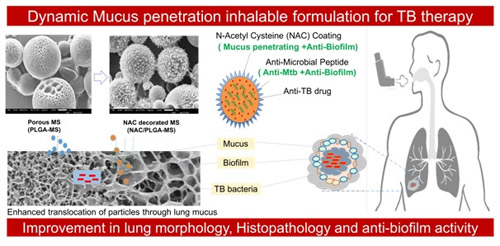 Scientists have developed a new inhalable formulation that can provide more efficient tuberculosis (TB) treatment and tackle the menace of antibiotic resistance.
Scientists have developed a new inhalable formulation that can provide more efficient tuberculosis (TB) treatment and tackle the menace of antibiotic resistance.
Antibiotic resistance is a challenge in the treatment of TB today as bacteria develop resistance against multiple drugs designed to kill them, turning them into superbugs. Researchers have now uncovered new ways to enhance the efficacy of drugs used to treat tuberculosis and antibiotic-resistant.
A team led by Dr. Rahul K Verma at the Institute of Nano Science & Technology, Mohali, an autonomous institute of Department of Science & Technology (DST), Government of India, has developed a new inhalable formulation containing combination of anti-TB peptide, drugs, and muco-active agents to effectively combat TB bacteria in the lungs. The muco-active agents can help to clear the dense mucus barrier in the TB infected lungs, which ease the formulation and drugs to target site of action. The research work supported by SERB, Department of Science and Technology (DST) has been published recently in the ‘Journal of Controlled Release’.
The newly developed formulation has proven to be extremely effective in laboratory animal trials in treating pulmonary tuberculosis, which can be helpful in reducing the antibiotic resistance, and the results are encouraging enough for further efficacy and toxicity studies in non-human primates, which could be extrapolated to human clinical trials. It killed more TB bacteria than a single anti-TB drug. Besides, it can be inhaled by the patient directly, allowing a higher concentration of medicine to reach the lungs compared to injections or orally-administered medicines. This will allow doctors to prescribe smaller, more effective drug doses to treat patients.
In TB therapy, the efficacy of the antibiotics decreases, and bacteria become resistant in the course of time due to the formation of several barriers like lung-mucus and biofilms around the microorganism. In this formulation, mucus-penetrating-microparticles [NAC/PLGA-MPP-N-acetylcysteine coated poly(lactic-co-glycolic acid) mucus penetrating particles] have been designed combining the benefits of TB drug, antimicrobial peptides (which provides an unconventional mechanism to combat the microbe and hence is less prone to AMR), and mucus penetrating agent. It has multiple advantages over conventional TB drugs like it directly reaches the lung via inhalation and tackles Multi-drug-resistant tuberculosis (MDR TB) using novel Antimicrobial peptides(AMP) therapy.
The formulation has been converted into innovative micro- technology-based powder formulations and can be administered to patients through simple inhalers, thus improving TB treatment and reduction of mortality.
Publication link:
DOI: 10.1016/j.jconrel.2020.05.013
For more details, Dr. Rahul K Verma (rahulverma[at]inst[dot]ac[dot]in) can be contacted.






























